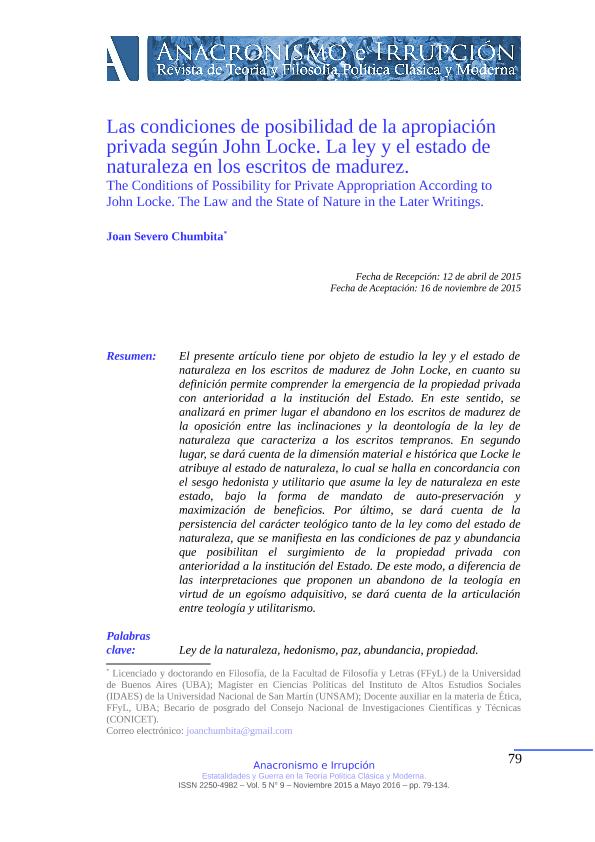Mostrar el registro sencillo del ítem
dc.contributor.author
Chumbita y Gamba, Joan Severo

dc.date.available
2019-02-21T19:54:50Z
dc.date.issued
2015-12
dc.identifier.citation
Chumbita y Gamba, Joan Severo; Las condiciones de posibilidad de la apropiación privada según John Locke. La ley y el estado de naturaleza en los escritos de madurez; Universidad de Buenos Aires. Facultad de Ciencias Sociales. Instituto de Investigaciones Gino Germani; Anacronismo e Irrupción; 5; 9; 12-2015; 79-134
dc.identifier.issn
2250-4982
dc.identifier.uri
http://hdl.handle.net/11336/70649
dc.description.abstract
El presente artículo tiene por objeto de estudio la ley y el estado de naturaleza en los escritos de madurez de John Locke, en cuanto su definición permite comprender la emergencia de la propiedad privada con anterioridad a la institución del Estado. En este sentido, se analizará en primer lugar el abandono en los escritos de madurez de la oposición entre las inclinaciones y la deontología de la ley de naturaleza que caracteriza a los escritos tempranos. En segundo lugar, se dará cuenta de la dimensión material e histórica que Locke le atribuye al estado de naturaleza, lo cual se halla en concordancia con el sesgo hedonista y utilitario que asume la ley de naturaleza en este estado, bajo la forma de mandato de auto-preservación y maximización de beneficios. Por último, se dará cuenta de la persistencia del carácter teológico tanto de la ley como del estado de naturaleza, que se manifiesta en las condiciones de paz y abundancia que posibilitan el surgimiento de la propiedad privada con anterioridad a la institución del Estado. De este modo, a diferencia de las interpretaciones que proponen un abandono de la teología en virtud de un egoísmo adquisitivo, se dará cuenta de la articulación entre teología y utilitarismo.
dc.description.abstract
The present article studies the law and the state of nature in John Locke’s later writings, to the extent that their definition makes it possible to understand the emergence of private property prior to the establishment of the State. In this respect, in the first place the article will analyze the abandonment in the mature writings of the opposition between the inclinations and the deontology of the law of nature characteristic of the early writings. In the second place, it will account for the material and historical dimension that Locke attributes to the state of nature, in accordance with the hedonistic and utilitarian bias assumed by the law of nature in this state, in the form of a mandate of self-preservation and the maximization of benefits. Finally, it will account for the persistence of the teleological character of both the law and of the state of nature manifested in the conditions of peace and abundance that make possible the emergence of private property prior to the establishment of the State. In this way, unlike the interpretations which propose an abandonment of theology in favor of an acquisitive egoism, it will demonstrate the articulation between theology and utilitarianism.
dc.format
application/pdf
dc.language.iso
spa
dc.publisher
Universidad de Buenos Aires. Facultad de Ciencias Sociales. Instituto de Investigaciones Gino Germani

dc.rights
info:eu-repo/semantics/openAccess
dc.rights.uri
https://creativecommons.org/licenses/by-nc-sa/2.5/ar/
dc.subject
Ley de La Naturaleza
dc.subject
Hedonismo
dc.subject
Propiedad
dc.subject
Paz
dc.subject.classification
Estudios Religiosos

dc.subject.classification
Filosofía, Ética y Religión

dc.subject.classification
HUMANIDADES

dc.title
Las condiciones de posibilidad de la apropiación privada según John Locke. La ley y el estado de naturaleza en los escritos de madurez
dc.title
The Conditions of Possibility for Private Appropriation According to John Locke. The Law and the State of Nature in the Later Writings
dc.type
info:eu-repo/semantics/article
dc.type
info:ar-repo/semantics/artículo
dc.type
info:eu-repo/semantics/publishedVersion
dc.date.updated
2019-02-21T14:55:31Z
dc.journal.volume
5
dc.journal.number
9
dc.journal.pagination
79-134
dc.journal.pais
Argentina

dc.journal.ciudad
Ciudad Autónoma de Buenos Aires
dc.description.fil
Fil: Chumbita y Gamba, Joan Severo. Universidad Nacional de San Martín. Instituto de Altos Estudios Sociales; Argentina. Consejo Nacional de Investigaciones Científicas y Técnicas; Argentina
dc.journal.title
Anacronismo e Irrupción
dc.relation.alternativeid
info:eu-repo/semantics/altIdentifier/url/https://dialnet.unirioja.es/servlet/articulo?codigo=5667689
dc.relation.alternativeid
info:eu-repo/semantics/altIdentifier/url/https://publicaciones.sociales.uba.ar/index.php/anacronismo/article/view/1517
Archivos asociados
